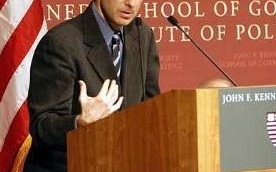Theodore C. Bestor, a professor of social anthropology and Japanese studies, will lead the Edwin O. Reischauer Institute of Japanese Studies’ mission to promote research and awareness of Japan in his new role as director.
Formerly the chair of the Anthropology Department, Bestor assumed his administrative position in July, taking over the reins from Interim Director Andrew D. Gordon.
Bestor, who specializes in contemporary Japanese culture, looks forward to facilitating exchanges with Japanese visitors and maintaining a vast network of Japanese scholars, but he also anticipates the opportunity to draw attention to Japanese affairs among the undergraduate community.
“I think it’s going to be a great pleasure to be director and I hope the Institute can continue to do what it’s been doing—get more and more undergraduates interested in and visiting Japan,” Bestor said.
Professor Arthur Kleinman, the director of Harvard University Asia Center, looks forward to collaborating with Bestor.
“I think he’ll be a creative and effective Director of the Reischauer Institute,” Kleinman said. “He himself is an outstanding Japanese scholar and as an anthropologist, he will help to bridge the humanistic and social science study of Japan.”
Professor Shigehisa Kuriyama echoed Kleinman’s sentiment, stating that Bestor’s work with the Association for Asian Studies will be an “important element in establishing wider connections between the Institute and Asian studies more broadly.” Bestor serves as president of the association,a scholarly organization which boasts a membership of about 8,000 academics from across the world. He plans to remain president despite his recent appointment.
With its 40th anniversary approaching this year, the Reischauer Institute will launch several initiatives to simultaneously celebrate and exhibit Japanese culture on campus, through art exhibitions, film displays, and food fairs, among other activities.
The forthcoming milestone will emphasize Bestor’s qualifications for direcdirector due to the extensive administrative experience that complements his academic accomplishments, Kuriyama said.
“Because he was chair of the Anthropology Department, he’s someone who can step in and lead the Institute with a very short hand. He doesn’t need a learning curve,” Kuriyama said.
Last year, a record 84 undergraduate and graduate students received grants from the Institute to complete internships and research opportunities in Japan.
Bestor has published books on topics ranging from the social dynamic of the Japanese Tsukiji fish market to the ethnography of local social institutions in Tokyo.
He was also the founding president of the Society for East Asian Anthropology, a branch of the American Anthropological Association.
“He is an eminent scholar in his field and incredibly knowledgeable about Japan. Certainly he will be a dynamic leader for the institute,” said professor Susan J. Pharr, former director of the Reischauer.
Read more in News
Faust, Burns Debut DocumentaryRecommended Articles
-
Harvard Welcomes Japanese History ProfessorDavid L. Howell, currently a professor of Japanese Studies at Princeton University, will join the East Languages and Civilizations Department in July.
-
 'Justice' Makes It to Japan
'Justice' Makes It to Japan -
Japanese Historian Bolsters EALC DepartmentTomiko Yoda, an intellectual and cultural historian who focuses on Japanese literary texts, will be joining the East Asian Language and Civilizations Department as a full professor in the coming academic year, bolstering the department's faculty body after it sustained four losses over the last few years.
-
 Scholars Discuss Recovery in Japan
Scholars Discuss Recovery in Japan -
Harvard Square Businesses Help JapanThree weeks after the March 11 earthquake that devastated Japan, Harvard Square businesses will be teaming up for a bake sale to benefit relief efforts this Saturday at Upstairs on the Square.
-
Economist Hiroshi Nakaso Discusses Future of JapanFollowing the recent Japanese earthquake and tsunami, policy makers in Japan have struggled to find a solution to the structural, and economic problems caused by the disaster, Japanese economist Hiroshi Nakaso said yesterday at the Harvard Kennedy School.













